Accountability in Health and Social Care: Practices and Record Keeping
VerifiedAdded on 2023/06/12
|9
|2415
|476
Essay
AI Summary
This essay delves into the critical concept of accountability within health and social care settings, emphasizing its role in ensuring patient safety and service efficacy. It examines various facets of accountability, including ethical considerations, legal obligations, and the responsibilities of healthcare workers, employers, and regulatory bodies. The essay highlights the importance of adhering to ethical codes, maintaining accurate records, and fostering effective communication among stakeholders. It further underscores the potential consequences of negligence or errors, stressing the need for vigilance and adherence to established protocols. The document also touches upon the role of professional regulators in establishing and enforcing relevant laws and guidelines and the importance of data protection within healthcare organizations. This student contributed assignment is available on Desklib, a platform offering a range of study tools and resources for students.
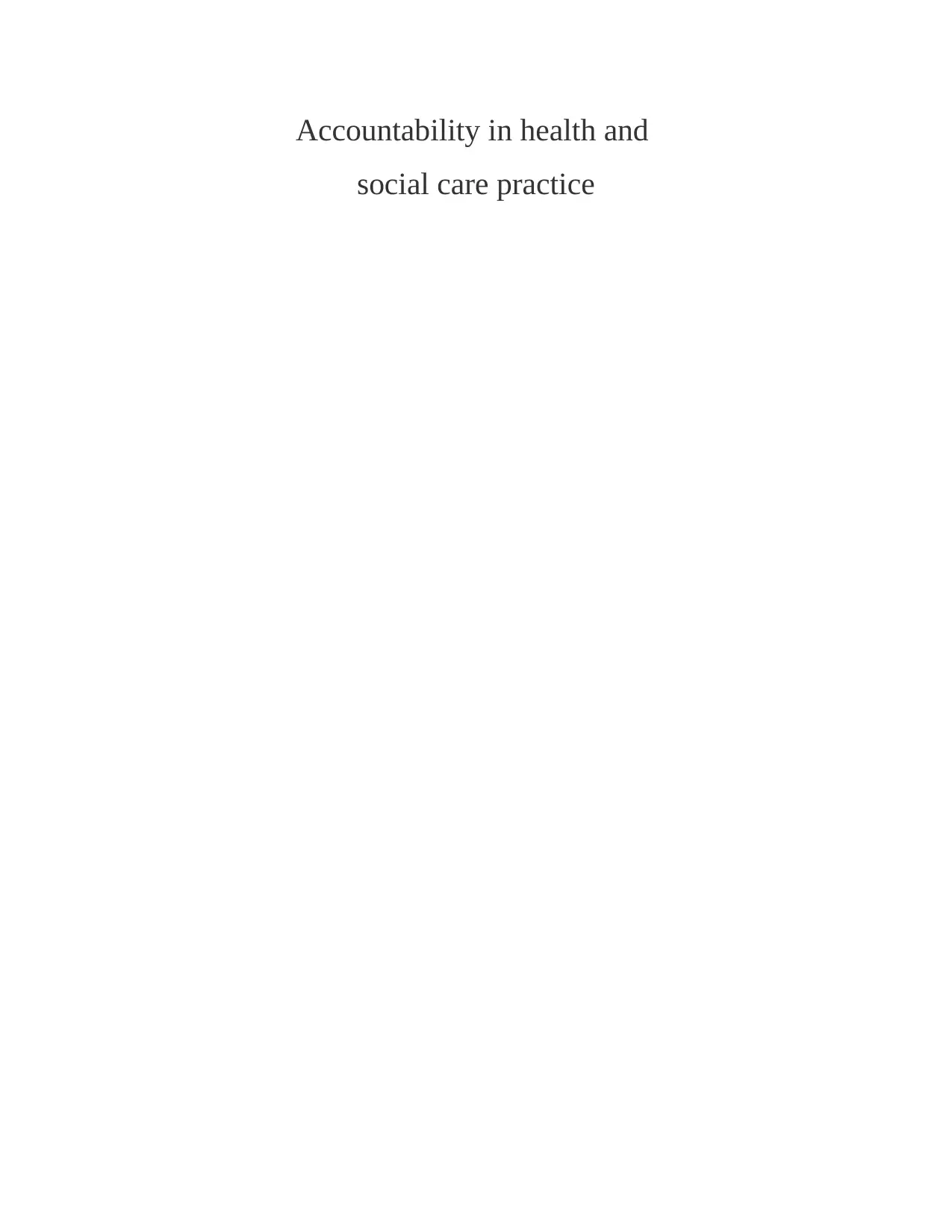
Accountability in health and
social care practice
social care practice
Paraphrase This Document
Need a fresh take? Get an instant paraphrase of this document with our AI Paraphraser
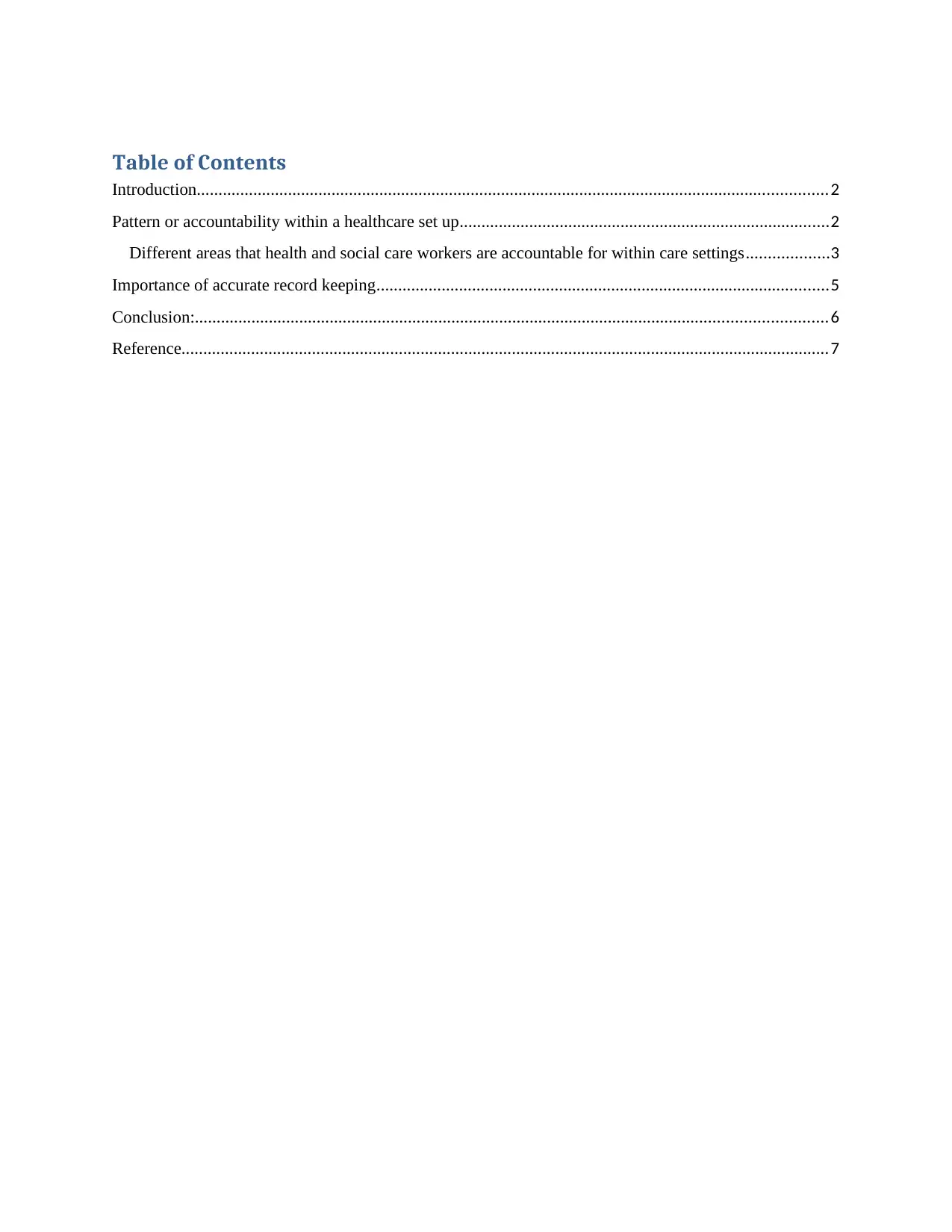
Table of Contents
Introduction.................................................................................................................................................2
Pattern or accountability within a healthcare set up.....................................................................................2
Different areas that health and social care workers are accountable for within care settings...................3
Importance of accurate record keeping........................................................................................................5
Conclusion:.................................................................................................................................................6
Reference.....................................................................................................................................................7
Introduction.................................................................................................................................................2
Pattern or accountability within a healthcare set up.....................................................................................2
Different areas that health and social care workers are accountable for within care settings...................3
Importance of accurate record keeping........................................................................................................5
Conclusion:.................................................................................................................................................6
Reference.....................................................................................................................................................7
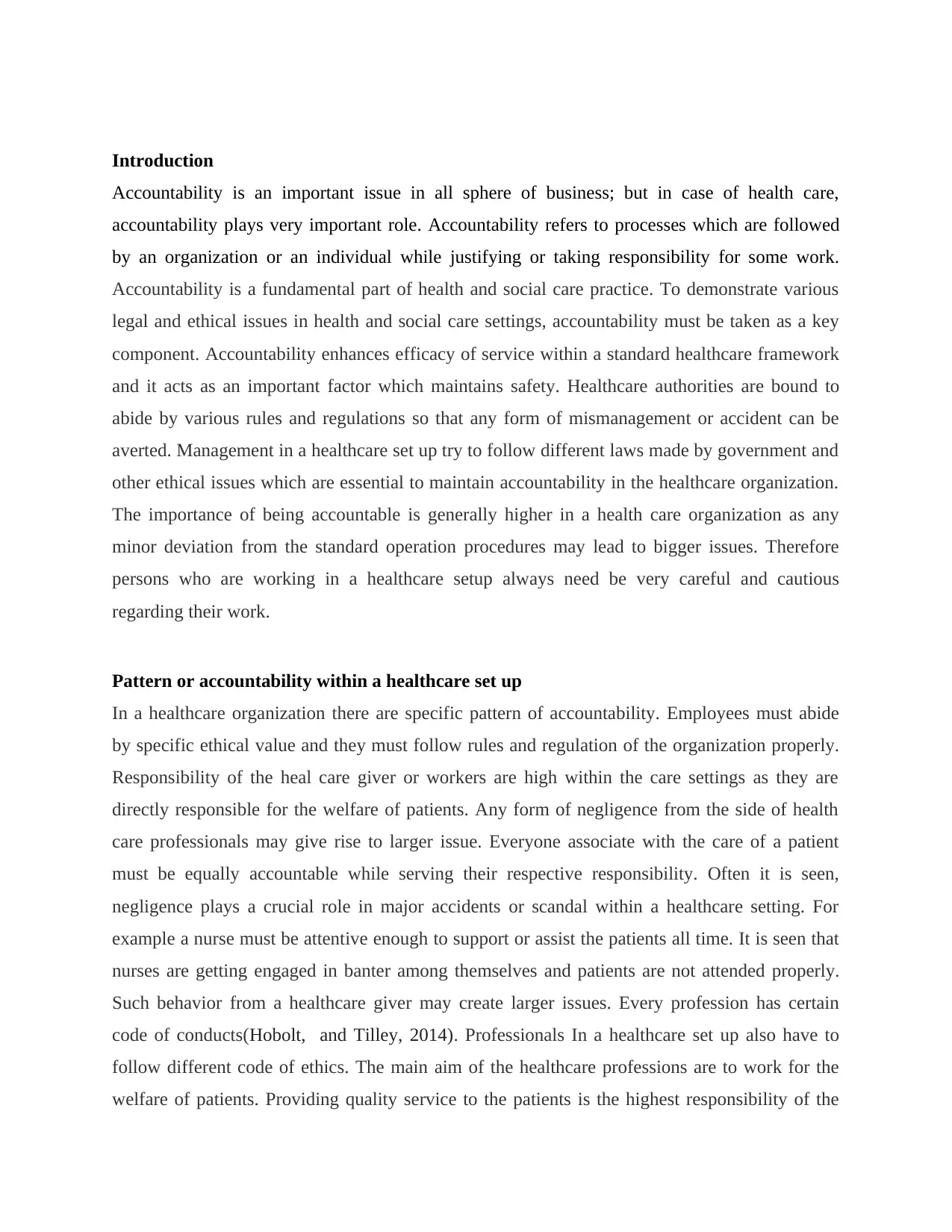
Introduction
Accountability is an important issue in all sphere of business; but in case of health care,
accountability plays very important role. Accountability refers to processes which are followed
by an organization or an individual while justifying or taking responsibility for some work.
Accountability is a fundamental part of health and social care practice. To demonstrate various
legal and ethical issues in health and social care settings, accountability must be taken as a key
component. Accountability enhances efficacy of service within a standard healthcare framework
and it acts as an important factor which maintains safety. Healthcare authorities are bound to
abide by various rules and regulations so that any form of mismanagement or accident can be
averted. Management in a healthcare set up try to follow different laws made by government and
other ethical issues which are essential to maintain accountability in the healthcare organization.
The importance of being accountable is generally higher in a health care organization as any
minor deviation from the standard operation procedures may lead to bigger issues. Therefore
persons who are working in a healthcare setup always need be very careful and cautious
regarding their work.
Pattern or accountability within a healthcare set up
In a healthcare organization there are specific pattern of accountability. Employees must abide
by specific ethical value and they must follow rules and regulation of the organization properly.
Responsibility of the heal care giver or workers are high within the care settings as they are
directly responsible for the welfare of patients. Any form of negligence from the side of health
care professionals may give rise to larger issue. Everyone associate with the care of a patient
must be equally accountable while serving their respective responsibility. Often it is seen,
negligence plays a crucial role in major accidents or scandal within a healthcare setting. For
example a nurse must be attentive enough to support or assist the patients all time. It is seen that
nurses are getting engaged in banter among themselves and patients are not attended properly.
Such behavior from a healthcare giver may create larger issues. Every profession has certain
code of conducts(Hobolt, and Tilley, 2014). Professionals In a healthcare set up also have to
follow different code of ethics. The main aim of the healthcare professions are to work for the
welfare of patients. Providing quality service to the patients is the highest responsibility of the
Accountability is an important issue in all sphere of business; but in case of health care,
accountability plays very important role. Accountability refers to processes which are followed
by an organization or an individual while justifying or taking responsibility for some work.
Accountability is a fundamental part of health and social care practice. To demonstrate various
legal and ethical issues in health and social care settings, accountability must be taken as a key
component. Accountability enhances efficacy of service within a standard healthcare framework
and it acts as an important factor which maintains safety. Healthcare authorities are bound to
abide by various rules and regulations so that any form of mismanagement or accident can be
averted. Management in a healthcare set up try to follow different laws made by government and
other ethical issues which are essential to maintain accountability in the healthcare organization.
The importance of being accountable is generally higher in a health care organization as any
minor deviation from the standard operation procedures may lead to bigger issues. Therefore
persons who are working in a healthcare setup always need be very careful and cautious
regarding their work.
Pattern or accountability within a healthcare set up
In a healthcare organization there are specific pattern of accountability. Employees must abide
by specific ethical value and they must follow rules and regulation of the organization properly.
Responsibility of the heal care giver or workers are high within the care settings as they are
directly responsible for the welfare of patients. Any form of negligence from the side of health
care professionals may give rise to larger issue. Everyone associate with the care of a patient
must be equally accountable while serving their respective responsibility. Often it is seen,
negligence plays a crucial role in major accidents or scandal within a healthcare setting. For
example a nurse must be attentive enough to support or assist the patients all time. It is seen that
nurses are getting engaged in banter among themselves and patients are not attended properly.
Such behavior from a healthcare giver may create larger issues. Every profession has certain
code of conducts(Hobolt, and Tilley, 2014). Professionals In a healthcare set up also have to
follow different code of ethics. The main aim of the healthcare professions are to work for the
welfare of patients. Providing quality service to the patients is the highest responsibility of the
⊘ This is a preview!⊘
Do you want full access?
Subscribe today to unlock all pages.

Trusted by 1+ million students worldwide
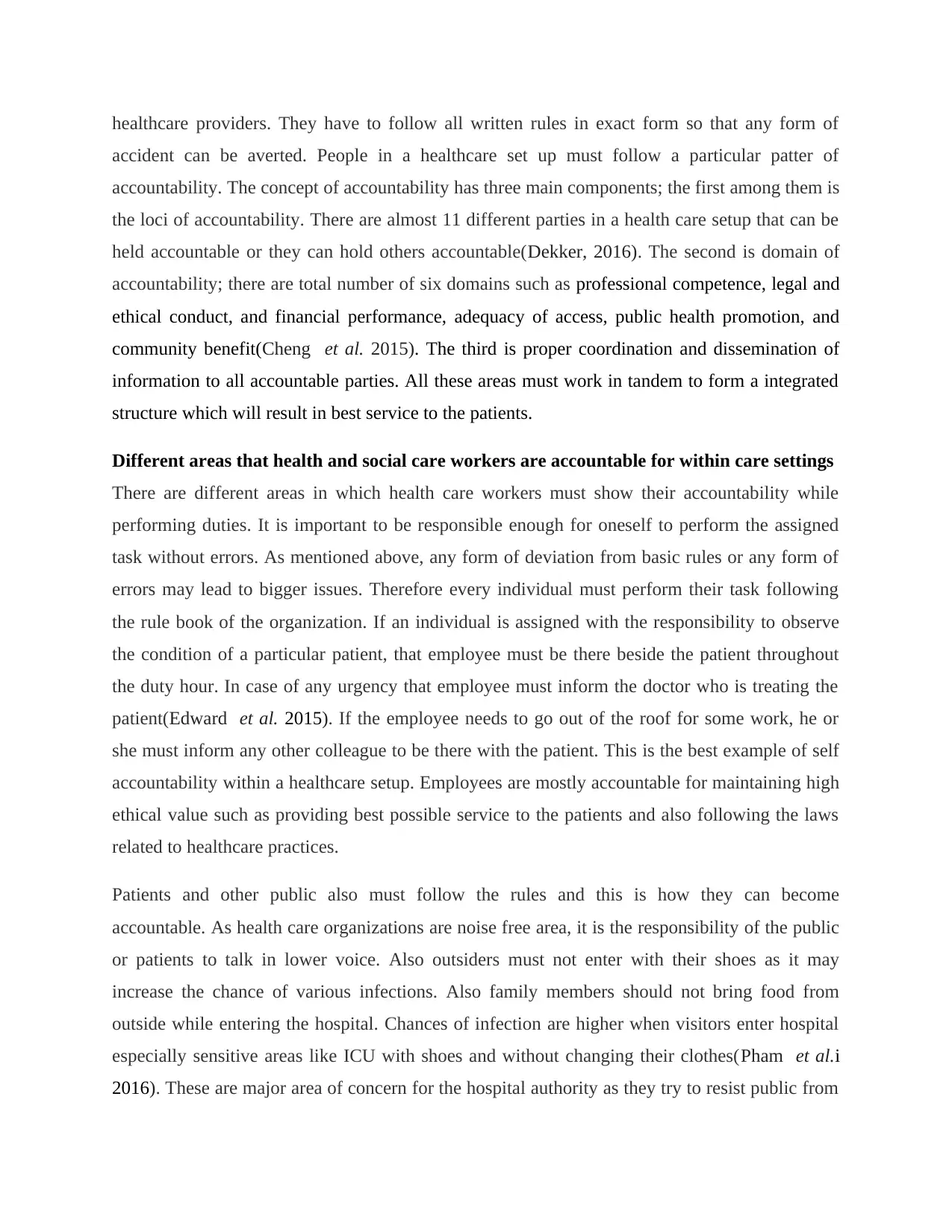
healthcare providers. They have to follow all written rules in exact form so that any form of
accident can be averted. People in a healthcare set up must follow a particular patter of
accountability. The concept of accountability has three main components; the first among them is
the loci of accountability. There are almost 11 different parties in a health care setup that can be
held accountable or they can hold others accountable(Dekker, 2016). The second is domain of
accountability; there are total number of six domains such as professional competence, legal and
ethical conduct, and financial performance, adequacy of access, public health promotion, and
community benefit(Cheng et al. 2015). The third is proper coordination and dissemination of
information to all accountable parties. All these areas must work in tandem to form a integrated
structure which will result in best service to the patients.
Different areas that health and social care workers are accountable for within care settings
There are different areas in which health care workers must show their accountability while
performing duties. It is important to be responsible enough for oneself to perform the assigned
task without errors. As mentioned above, any form of deviation from basic rules or any form of
errors may lead to bigger issues. Therefore every individual must perform their task following
the rule book of the organization. If an individual is assigned with the responsibility to observe
the condition of a particular patient, that employee must be there beside the patient throughout
the duty hour. In case of any urgency that employee must inform the doctor who is treating the
patient(Edward et al. 2015). If the employee needs to go out of the roof for some work, he or
she must inform any other colleague to be there with the patient. This is the best example of self
accountability within a healthcare setup. Employees are mostly accountable for maintaining high
ethical value such as providing best possible service to the patients and also following the laws
related to healthcare practices.
Patients and other public also must follow the rules and this is how they can become
accountable. As health care organizations are noise free area, it is the responsibility of the public
or patients to talk in lower voice. Also outsiders must not enter with their shoes as it may
increase the chance of various infections. Also family members should not bring food from
outside while entering the hospital. Chances of infection are higher when visitors enter hospital
especially sensitive areas like ICU with shoes and without changing their clothes(Pham et al.i
2016). These are major area of concern for the hospital authority as they try to resist public from
accident can be averted. People in a healthcare set up must follow a particular patter of
accountability. The concept of accountability has three main components; the first among them is
the loci of accountability. There are almost 11 different parties in a health care setup that can be
held accountable or they can hold others accountable(Dekker, 2016). The second is domain of
accountability; there are total number of six domains such as professional competence, legal and
ethical conduct, and financial performance, adequacy of access, public health promotion, and
community benefit(Cheng et al. 2015). The third is proper coordination and dissemination of
information to all accountable parties. All these areas must work in tandem to form a integrated
structure which will result in best service to the patients.
Different areas that health and social care workers are accountable for within care settings
There are different areas in which health care workers must show their accountability while
performing duties. It is important to be responsible enough for oneself to perform the assigned
task without errors. As mentioned above, any form of deviation from basic rules or any form of
errors may lead to bigger issues. Therefore every individual must perform their task following
the rule book of the organization. If an individual is assigned with the responsibility to observe
the condition of a particular patient, that employee must be there beside the patient throughout
the duty hour. In case of any urgency that employee must inform the doctor who is treating the
patient(Edward et al. 2015). If the employee needs to go out of the roof for some work, he or
she must inform any other colleague to be there with the patient. This is the best example of self
accountability within a healthcare setup. Employees are mostly accountable for maintaining high
ethical value such as providing best possible service to the patients and also following the laws
related to healthcare practices.
Patients and other public also must follow the rules and this is how they can become
accountable. As health care organizations are noise free area, it is the responsibility of the public
or patients to talk in lower voice. Also outsiders must not enter with their shoes as it may
increase the chance of various infections. Also family members should not bring food from
outside while entering the hospital. Chances of infection are higher when visitors enter hospital
especially sensitive areas like ICU with shoes and without changing their clothes(Pham et al.i
2016). These are major area of concern for the hospital authority as they try to resist public from
Paraphrase This Document
Need a fresh take? Get an instant paraphrase of this document with our AI Paraphraser
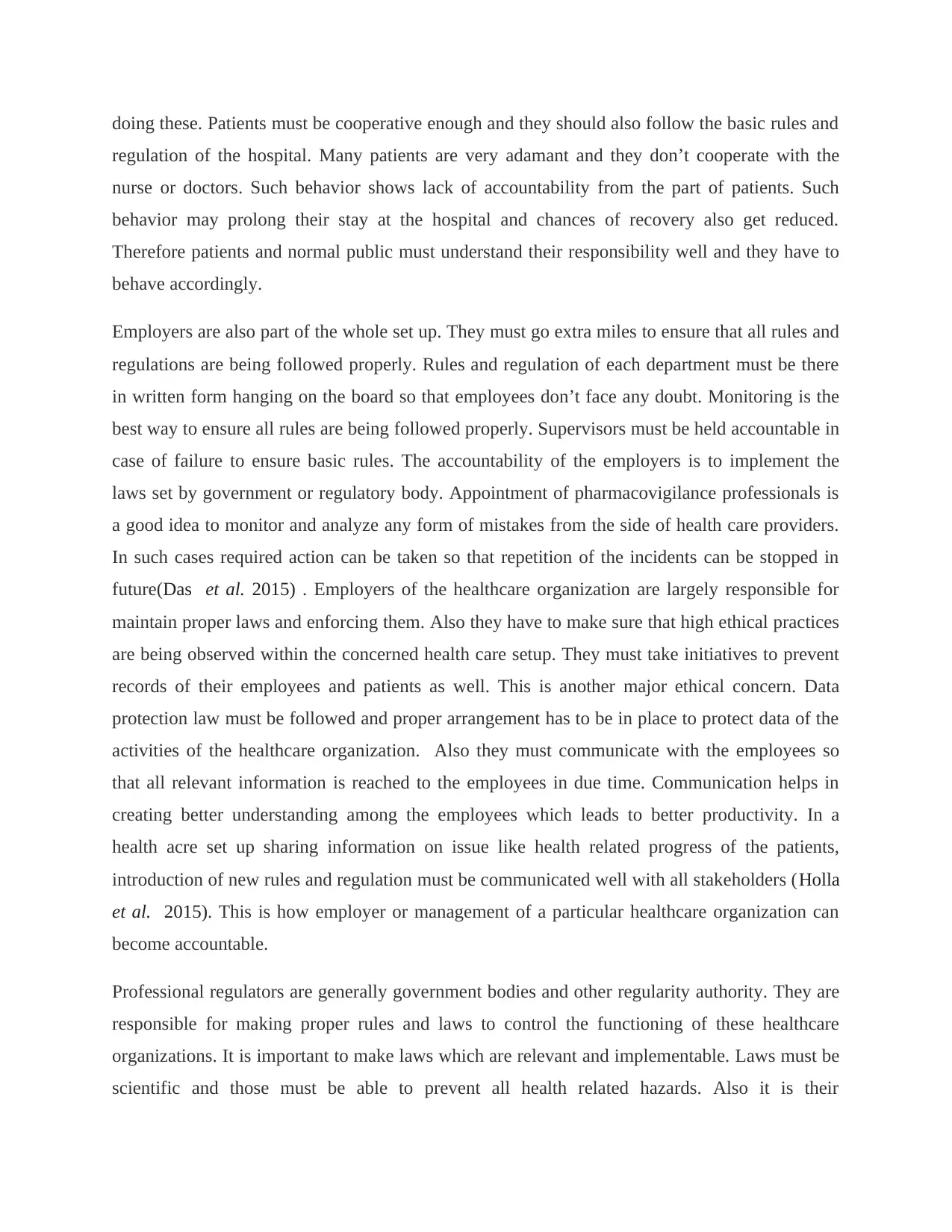
doing these. Patients must be cooperative enough and they should also follow the basic rules and
regulation of the hospital. Many patients are very adamant and they don’t cooperate with the
nurse or doctors. Such behavior shows lack of accountability from the part of patients. Such
behavior may prolong their stay at the hospital and chances of recovery also get reduced.
Therefore patients and normal public must understand their responsibility well and they have to
behave accordingly.
Employers are also part of the whole set up. They must go extra miles to ensure that all rules and
regulations are being followed properly. Rules and regulation of each department must be there
in written form hanging on the board so that employees don’t face any doubt. Monitoring is the
best way to ensure all rules are being followed properly. Supervisors must be held accountable in
case of failure to ensure basic rules. The accountability of the employers is to implement the
laws set by government or regulatory body. Appointment of pharmacovigilance professionals is
a good idea to monitor and analyze any form of mistakes from the side of health care providers.
In such cases required action can be taken so that repetition of the incidents can be stopped in
future(Das et al. 2015) . Employers of the healthcare organization are largely responsible for
maintain proper laws and enforcing them. Also they have to make sure that high ethical practices
are being observed within the concerned health care setup. They must take initiatives to prevent
records of their employees and patients as well. This is another major ethical concern. Data
protection law must be followed and proper arrangement has to be in place to protect data of the
activities of the healthcare organization. Also they must communicate with the employees so
that all relevant information is reached to the employees in due time. Communication helps in
creating better understanding among the employees which leads to better productivity. In a
health acre set up sharing information on issue like health related progress of the patients,
introduction of new rules and regulation must be communicated well with all stakeholders (Holla
et al. 2015). This is how employer or management of a particular healthcare organization can
become accountable.
Professional regulators are generally government bodies and other regularity authority. They are
responsible for making proper rules and laws to control the functioning of these healthcare
organizations. It is important to make laws which are relevant and implementable. Laws must be
scientific and those must be able to prevent all health related hazards. Also it is their
regulation of the hospital. Many patients are very adamant and they don’t cooperate with the
nurse or doctors. Such behavior shows lack of accountability from the part of patients. Such
behavior may prolong their stay at the hospital and chances of recovery also get reduced.
Therefore patients and normal public must understand their responsibility well and they have to
behave accordingly.
Employers are also part of the whole set up. They must go extra miles to ensure that all rules and
regulations are being followed properly. Rules and regulation of each department must be there
in written form hanging on the board so that employees don’t face any doubt. Monitoring is the
best way to ensure all rules are being followed properly. Supervisors must be held accountable in
case of failure to ensure basic rules. The accountability of the employers is to implement the
laws set by government or regulatory body. Appointment of pharmacovigilance professionals is
a good idea to monitor and analyze any form of mistakes from the side of health care providers.
In such cases required action can be taken so that repetition of the incidents can be stopped in
future(Das et al. 2015) . Employers of the healthcare organization are largely responsible for
maintain proper laws and enforcing them. Also they have to make sure that high ethical practices
are being observed within the concerned health care setup. They must take initiatives to prevent
records of their employees and patients as well. This is another major ethical concern. Data
protection law must be followed and proper arrangement has to be in place to protect data of the
activities of the healthcare organization. Also they must communicate with the employees so
that all relevant information is reached to the employees in due time. Communication helps in
creating better understanding among the employees which leads to better productivity. In a
health acre set up sharing information on issue like health related progress of the patients,
introduction of new rules and regulation must be communicated well with all stakeholders (Holla
et al. 2015). This is how employer or management of a particular healthcare organization can
become accountable.
Professional regulators are generally government bodies and other regularity authority. They are
responsible for making proper rules and laws to control the functioning of these healthcare
organizations. It is important to make laws which are relevant and implementable. Laws must be
scientific and those must be able to prevent all health related hazards. Also it is their
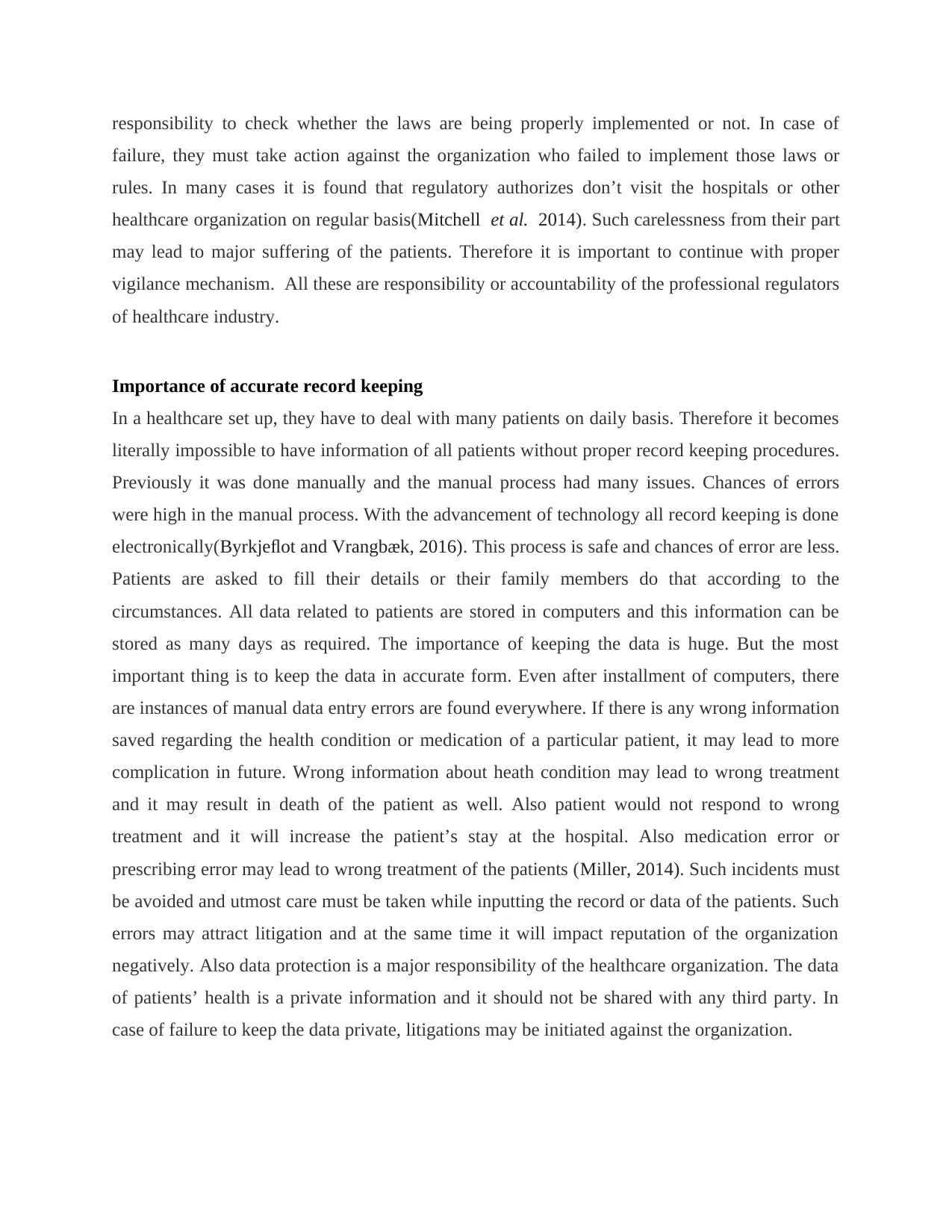
responsibility to check whether the laws are being properly implemented or not. In case of
failure, they must take action against the organization who failed to implement those laws or
rules. In many cases it is found that regulatory authorizes don’t visit the hospitals or other
healthcare organization on regular basis(Mitchell et al. 2014). Such carelessness from their part
may lead to major suffering of the patients. Therefore it is important to continue with proper
vigilance mechanism. All these are responsibility or accountability of the professional regulators
of healthcare industry.
Importance of accurate record keeping
In a healthcare set up, they have to deal with many patients on daily basis. Therefore it becomes
literally impossible to have information of all patients without proper record keeping procedures.
Previously it was done manually and the manual process had many issues. Chances of errors
were high in the manual process. With the advancement of technology all record keeping is done
electronically(Byrkjeflot and Vrangbæk, 2016). This process is safe and chances of error are less.
Patients are asked to fill their details or their family members do that according to the
circumstances. All data related to patients are stored in computers and this information can be
stored as many days as required. The importance of keeping the data is huge. But the most
important thing is to keep the data in accurate form. Even after installment of computers, there
are instances of manual data entry errors are found everywhere. If there is any wrong information
saved regarding the health condition or medication of a particular patient, it may lead to more
complication in future. Wrong information about heath condition may lead to wrong treatment
and it may result in death of the patient as well. Also patient would not respond to wrong
treatment and it will increase the patient’s stay at the hospital. Also medication error or
prescribing error may lead to wrong treatment of the patients (Miller, 2014). Such incidents must
be avoided and utmost care must be taken while inputting the record or data of the patients. Such
errors may attract litigation and at the same time it will impact reputation of the organization
negatively. Also data protection is a major responsibility of the healthcare organization. The data
of patients’ health is a private information and it should not be shared with any third party. In
case of failure to keep the data private, litigations may be initiated against the organization.
failure, they must take action against the organization who failed to implement those laws or
rules. In many cases it is found that regulatory authorizes don’t visit the hospitals or other
healthcare organization on regular basis(Mitchell et al. 2014). Such carelessness from their part
may lead to major suffering of the patients. Therefore it is important to continue with proper
vigilance mechanism. All these are responsibility or accountability of the professional regulators
of healthcare industry.
Importance of accurate record keeping
In a healthcare set up, they have to deal with many patients on daily basis. Therefore it becomes
literally impossible to have information of all patients without proper record keeping procedures.
Previously it was done manually and the manual process had many issues. Chances of errors
were high in the manual process. With the advancement of technology all record keeping is done
electronically(Byrkjeflot and Vrangbæk, 2016). This process is safe and chances of error are less.
Patients are asked to fill their details or their family members do that according to the
circumstances. All data related to patients are stored in computers and this information can be
stored as many days as required. The importance of keeping the data is huge. But the most
important thing is to keep the data in accurate form. Even after installment of computers, there
are instances of manual data entry errors are found everywhere. If there is any wrong information
saved regarding the health condition or medication of a particular patient, it may lead to more
complication in future. Wrong information about heath condition may lead to wrong treatment
and it may result in death of the patient as well. Also patient would not respond to wrong
treatment and it will increase the patient’s stay at the hospital. Also medication error or
prescribing error may lead to wrong treatment of the patients (Miller, 2014). Such incidents must
be avoided and utmost care must be taken while inputting the record or data of the patients. Such
errors may attract litigation and at the same time it will impact reputation of the organization
negatively. Also data protection is a major responsibility of the healthcare organization. The data
of patients’ health is a private information and it should not be shared with any third party. In
case of failure to keep the data private, litigations may be initiated against the organization.
⊘ This is a preview!⊘
Do you want full access?
Subscribe today to unlock all pages.

Trusted by 1+ million students worldwide
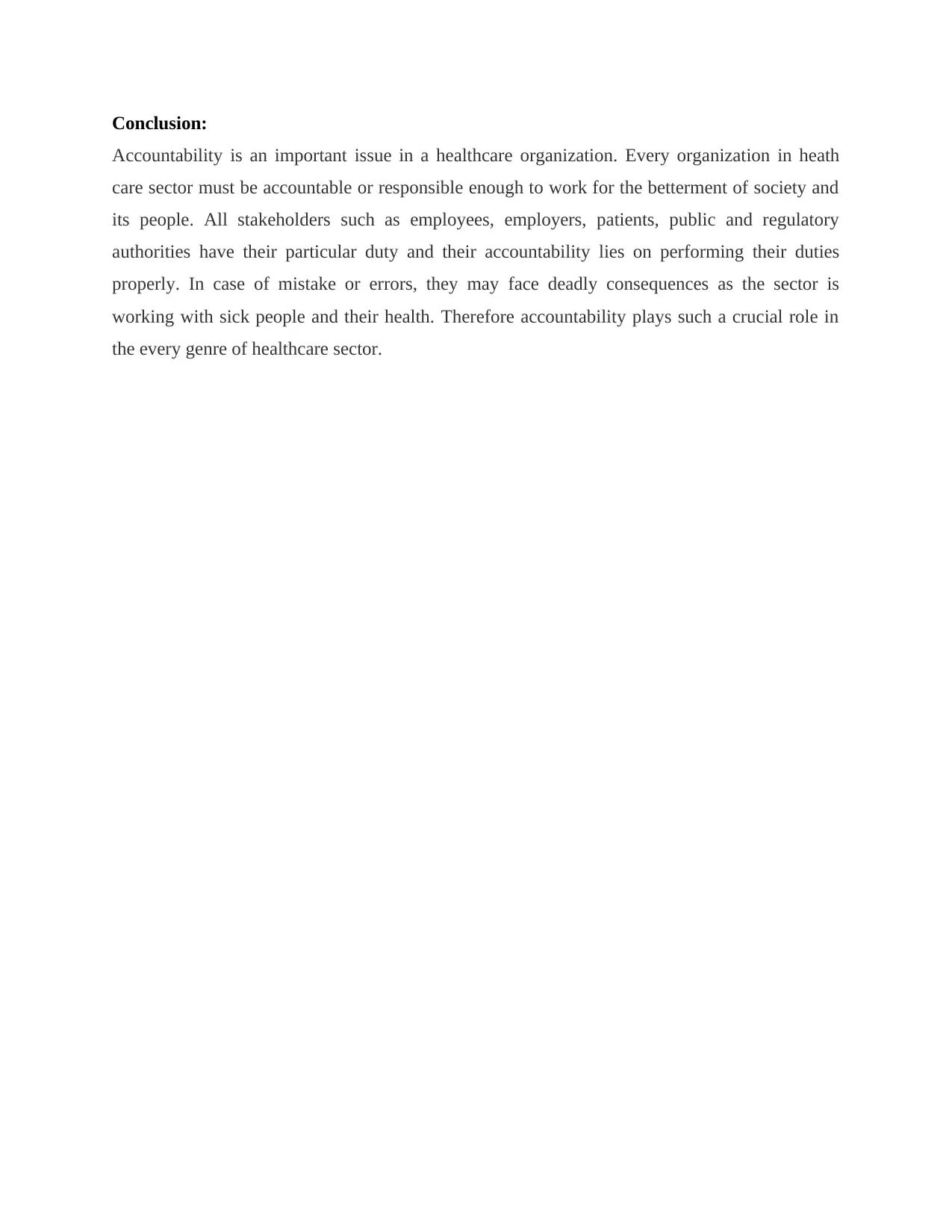
Conclusion:
Accountability is an important issue in a healthcare organization. Every organization in heath
care sector must be accountable or responsible enough to work for the betterment of society and
its people. All stakeholders such as employees, employers, patients, public and regulatory
authorities have their particular duty and their accountability lies on performing their duties
properly. In case of mistake or errors, they may face deadly consequences as the sector is
working with sick people and their health. Therefore accountability plays such a crucial role in
the every genre of healthcare sector.
Accountability is an important issue in a healthcare organization. Every organization in heath
care sector must be accountable or responsible enough to work for the betterment of society and
its people. All stakeholders such as employees, employers, patients, public and regulatory
authorities have their particular duty and their accountability lies on performing their duties
properly. In case of mistake or errors, they may face deadly consequences as the sector is
working with sick people and their health. Therefore accountability plays such a crucial role in
the every genre of healthcare sector.
Paraphrase This Document
Need a fresh take? Get an instant paraphrase of this document with our AI Paraphraser
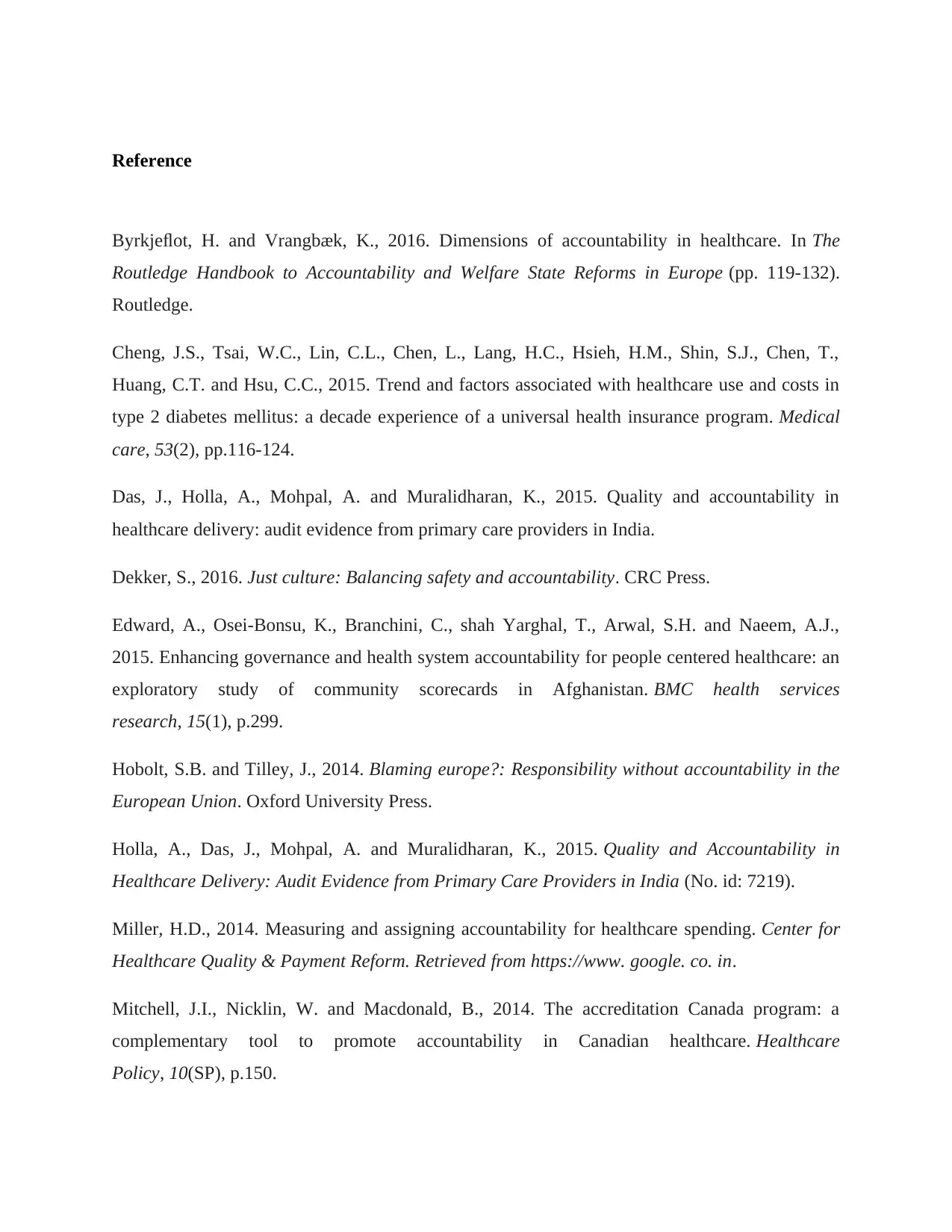
Reference
Byrkjeflot, H. and Vrangbæk, K., 2016. Dimensions of accountability in healthcare. In The
Routledge Handbook to Accountability and Welfare State Reforms in Europe (pp. 119-132).
Routledge.
Cheng, J.S., Tsai, W.C., Lin, C.L., Chen, L., Lang, H.C., Hsieh, H.M., Shin, S.J., Chen, T.,
Huang, C.T. and Hsu, C.C., 2015. Trend and factors associated with healthcare use and costs in
type 2 diabetes mellitus: a decade experience of a universal health insurance program. Medical
care, 53(2), pp.116-124.
Das, J., Holla, A., Mohpal, A. and Muralidharan, K., 2015. Quality and accountability in
healthcare delivery: audit evidence from primary care providers in India.
Dekker, S., 2016. Just culture: Balancing safety and accountability. CRC Press.
Edward, A., Osei-Bonsu, K., Branchini, C., shah Yarghal, T., Arwal, S.H. and Naeem, A.J.,
2015. Enhancing governance and health system accountability for people centered healthcare: an
exploratory study of community scorecards in Afghanistan. BMC health services
research, 15(1), p.299.
Hobolt, S.B. and Tilley, J., 2014. Blaming europe?: Responsibility without accountability in the
European Union. Oxford University Press.
Holla, A., Das, J., Mohpal, A. and Muralidharan, K., 2015. Quality and Accountability in
Healthcare Delivery: Audit Evidence from Primary Care Providers in India (No. id: 7219).
Miller, H.D., 2014. Measuring and assigning accountability for healthcare spending. Center for
Healthcare Quality & Payment Reform. Retrieved from https://www. google. co. in.
Mitchell, J.I., Nicklin, W. and Macdonald, B., 2014. The accreditation Canada program: a
complementary tool to promote accountability in Canadian healthcare. Healthcare
Policy, 10(SP), p.150.
Byrkjeflot, H. and Vrangbæk, K., 2016. Dimensions of accountability in healthcare. In The
Routledge Handbook to Accountability and Welfare State Reforms in Europe (pp. 119-132).
Routledge.
Cheng, J.S., Tsai, W.C., Lin, C.L., Chen, L., Lang, H.C., Hsieh, H.M., Shin, S.J., Chen, T.,
Huang, C.T. and Hsu, C.C., 2015. Trend and factors associated with healthcare use and costs in
type 2 diabetes mellitus: a decade experience of a universal health insurance program. Medical
care, 53(2), pp.116-124.
Das, J., Holla, A., Mohpal, A. and Muralidharan, K., 2015. Quality and accountability in
healthcare delivery: audit evidence from primary care providers in India.
Dekker, S., 2016. Just culture: Balancing safety and accountability. CRC Press.
Edward, A., Osei-Bonsu, K., Branchini, C., shah Yarghal, T., Arwal, S.H. and Naeem, A.J.,
2015. Enhancing governance and health system accountability for people centered healthcare: an
exploratory study of community scorecards in Afghanistan. BMC health services
research, 15(1), p.299.
Hobolt, S.B. and Tilley, J., 2014. Blaming europe?: Responsibility without accountability in the
European Union. Oxford University Press.
Holla, A., Das, J., Mohpal, A. and Muralidharan, K., 2015. Quality and Accountability in
Healthcare Delivery: Audit Evidence from Primary Care Providers in India (No. id: 7219).
Miller, H.D., 2014. Measuring and assigning accountability for healthcare spending. Center for
Healthcare Quality & Payment Reform. Retrieved from https://www. google. co. in.
Mitchell, J.I., Nicklin, W. and Macdonald, B., 2014. The accreditation Canada program: a
complementary tool to promote accountability in Canadian healthcare. Healthcare
Policy, 10(SP), p.150.
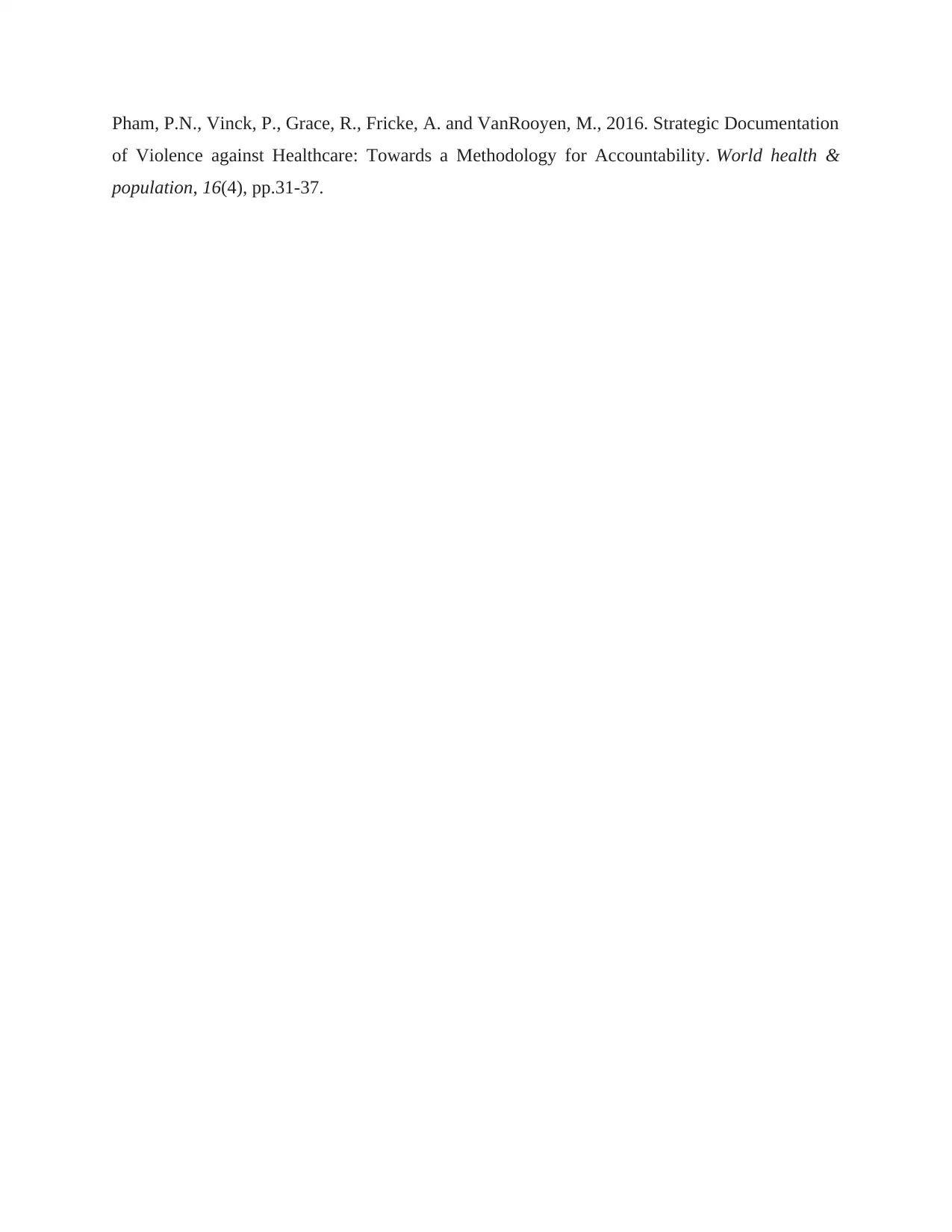
Pham, P.N., Vinck, P., Grace, R., Fricke, A. and VanRooyen, M., 2016. Strategic Documentation
of Violence against Healthcare: Towards a Methodology for Accountability. World health &
population, 16(4), pp.31-37.
of Violence against Healthcare: Towards a Methodology for Accountability. World health &
population, 16(4), pp.31-37.
⊘ This is a preview!⊘
Do you want full access?
Subscribe today to unlock all pages.

Trusted by 1+ million students worldwide
1 out of 9
Related Documents
Your All-in-One AI-Powered Toolkit for Academic Success.
+13062052269
info@desklib.com
Available 24*7 on WhatsApp / Email
![[object Object]](/_next/static/media/star-bottom.7253800d.svg)
Unlock your academic potential
Copyright © 2020–2025 A2Z Services. All Rights Reserved. Developed and managed by ZUCOL.




